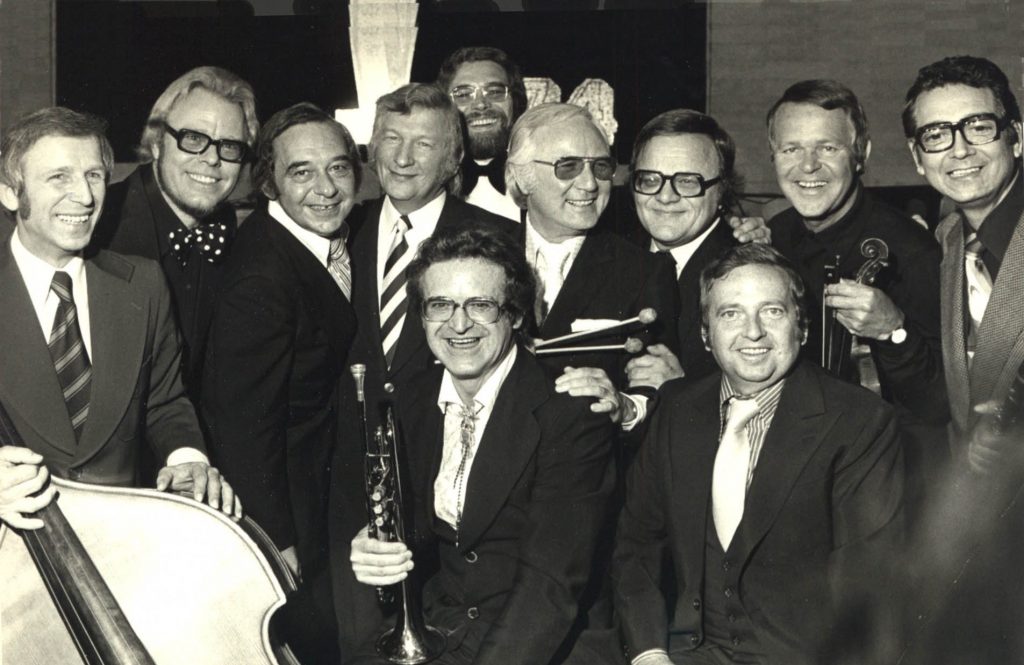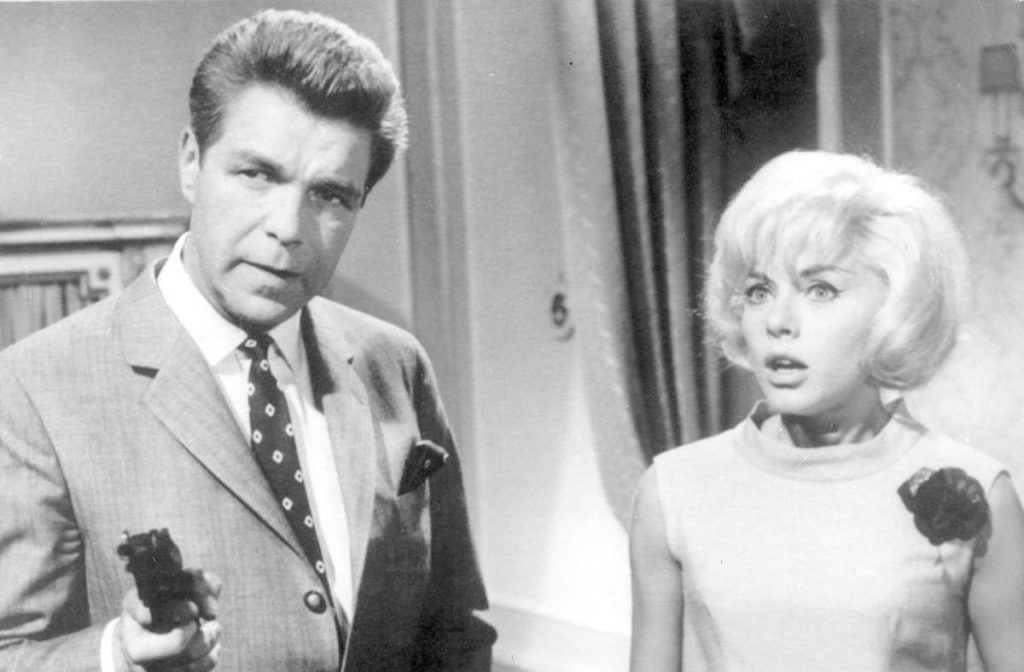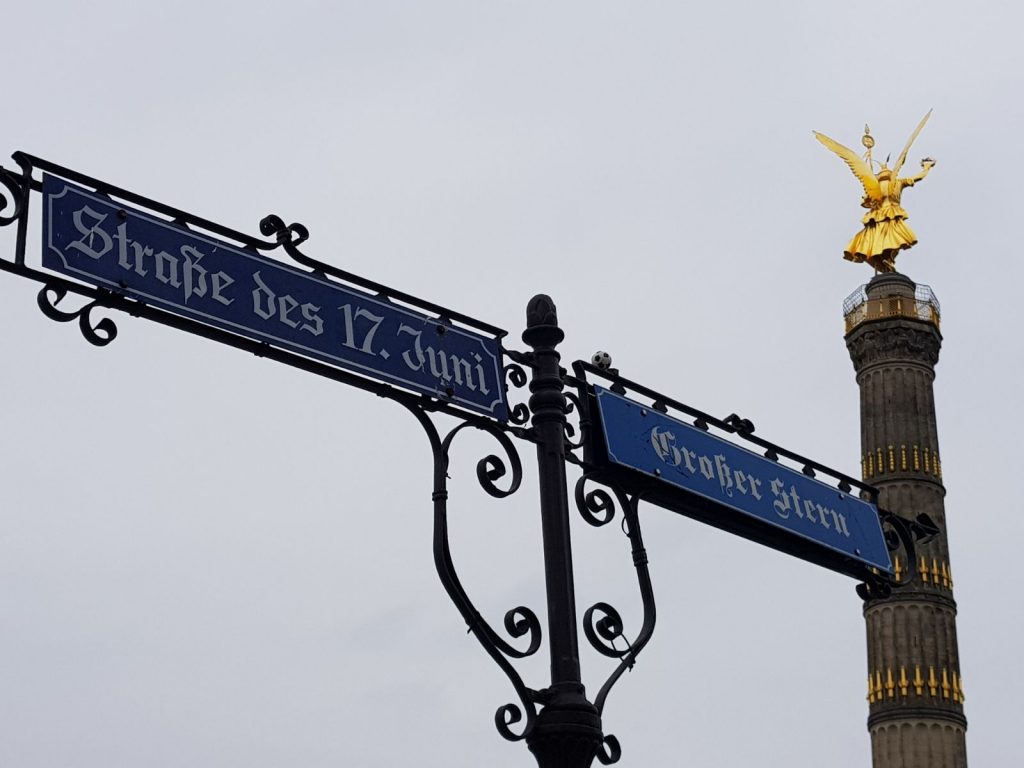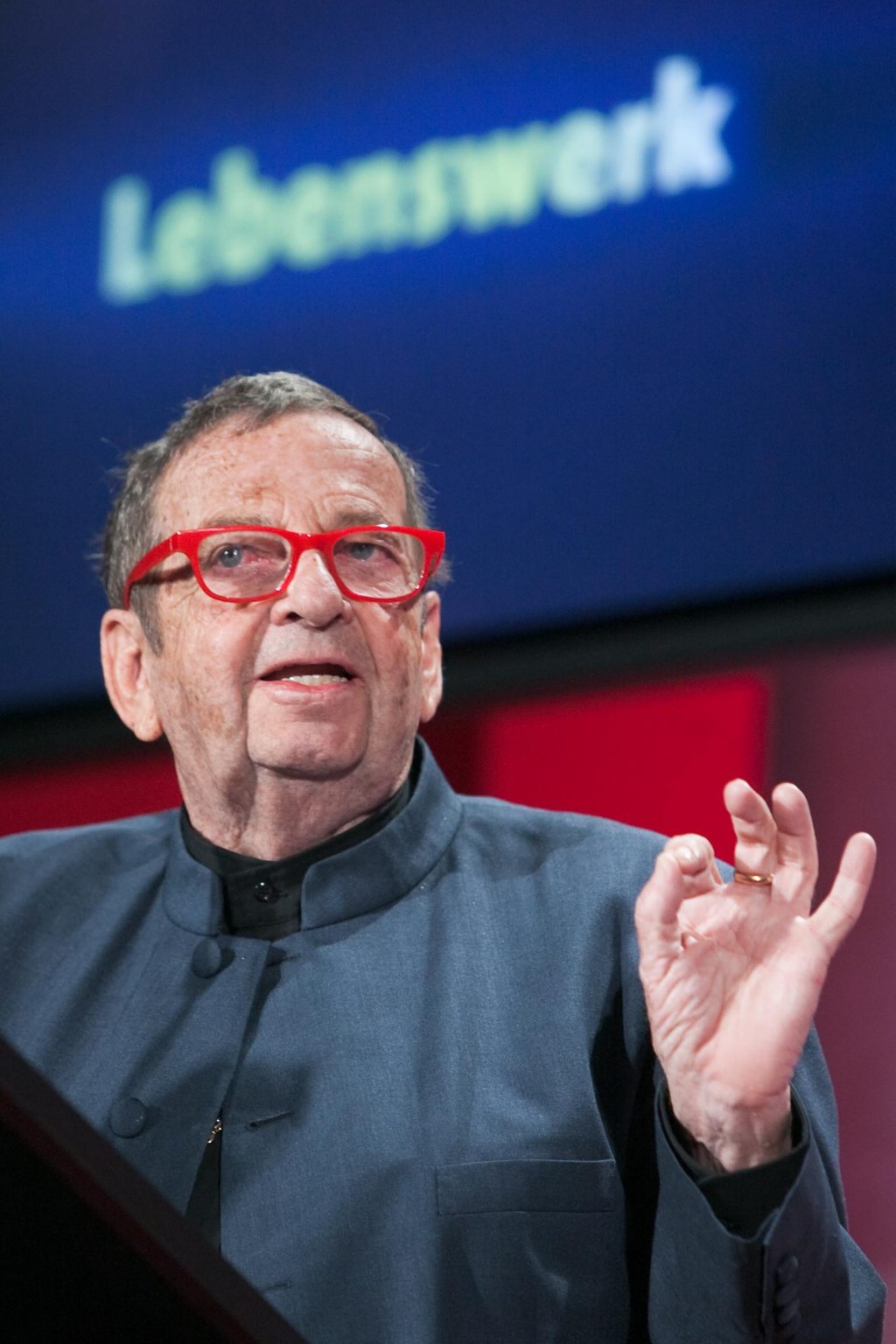Close
Summer 1960 saw the start of shooting for Flucht nach Berlin (Escape to Berlin), a film by renowned editor turned first-time director Will Tremper. For Peter, the collaboration with Will Tremper was of immense value. While the film did not achieve the hoped-for success at the box office, the music was awarded a coveted ‘Filmband in Gold’, one of the highest honours in German cinema of that era. “As the old saying goes,” mused Peter, “the higher you rise, the harder you fall.” In Will Tremper, Peter had found a like-minded partner: one who offered whole-hearted support for unconventional and experimental musical solutions. Peter, for his part, was a great admirer of Tremper’s “unconventional cinematic techniques”. Other films by the pair include Die unendliche Nacht (The Endless Night) (whose soundtrack was also honoured with a German Film Award), Playgirl (Playgirl) and Verspätung in Marienborn (Stop Train 349).
Peter’s work on the soundtrack for the Edgar Wallace film Die seltsame Gräfin (The Strange Countess) (1961) afforded him his greatest career boost to date. By 1971, Peter had composed music for a total of 18 films in the popular Edgar Wallace mystery series. This, along with his music for the films Der weiße Spinne (The White Spider) (1963), Ein Alibir zerbricht (An Alibi for Death) (1963), Das Wirtshaus von Dartmoor (The Inn on Dartmoor) (1964) and the eight-part Jerry Cotton film series (1965 to 1969) saw Peter recognised as a leading composer for German crime films of that era. Peter also found time to compose the signature fanfare for German production company Constantin Film.
This film by Will Tremper, a visionary of his era, plays out over a single night and connects the fates of various travellers stranded at Tempelhof airport due to thick fog. An early (1963) contribution to the New German Cinema movement, it transformed its entire cast into stars of the silver screen – a true work of cinematic art!
For the music, Will Tremper once again turned to Peter Thomas. “We were only able to film at night,” Peter recalled of the filming conditions, “since normal air traffic occupied the airport all through the day. When Will Tremper saw a Polish jazz ensemble sat by the entrance, he invited them to join us. At midnight, he sent for a Bösendorfer grand piano, and he and jazz singer Wanda Warksa gave a live rendition of the song Kom leg Deinen Arm um mich (Come, lay your arm around me) to accompany the shoot. To be sure, these live acts were very special – yet they are also the kind that happen quite regularly when true professionals get together. It took a total of four days to record the music.”
Written between 1965 and 1969, Peter’s soundtracks to the eight Jerry Cotton films are the undisputed highlight of the series. Just as the Jerry Cotton filmmakers reconstructed New York City, Peter reconstructed American Jazz, fusing together sounds that are in equal parts reminiscent of the military, lounge music, wild pursuits and the circus. As Peter did so, he embraced the spirit of jazz whole-heartedly, entertaining listeners with a unique peppering of gunshots, screams, scat singing and unbridled improvisation.
When the first ever German science fiction series Raumpatrouille Orion (Space Patrol Orion) landed on German TV screens – in a prime-time spot after ARD’s flagship news show Tagesschau – viewers could hardly believe what they were seeing or hearing. They followed along as a courageous crew made up of Major Cliff Allister McLane (commander of the spaceship Orion, played by Dietmar Schönherr) and General Lydia van Dyke (played by Charlotte Herr, wife of Swiss author F. Dürrenmatt) went on fantastical adventures through space.
This TV mega-hit was set to futuristic, funky music by Peter. The theme begins with a now-legendary, Kraftwerk-esque vocoder countdown – “10, 9, 8, 7, 6, 5, 4, 3, 2 1” – before arriving at the heavily swing-influenced title melody Space Patrol. The Berlin dialect for which Peter was so well known is celebrated here in the pronunciation of the German number five (“fünef”, in the Berlin accent)!
Vodka and national affairs do not make good bedfellows – at least not when the queen's motto is:
“Vodka für die Königin, Königin, Königin
Wodka liebt die Königin, mehr als Cognac, Rum und Gin
Vodka für die Königin, Königin
Wodka trinkt die Königin, für ihr Herz als Medizin”
(“Vodka for the queen, queen, queen
Vodka’s what the queen loves more than cognac, rum or gin
Vodka for the queen, queen, queen
Vodka’s what the queen drinks for her heart, as medicine”)
“Peter was responsible for the music – and it delivers just the punch you’d expect from a lyric like “Sexico City, Sexico City, Sexico City / That’s the city in a winged dress”. It’s the musical lovechild of The Cousin from Nowhere and new German schmaltz.” (Helmut Kasarek writing in Die Zeit, 1968)
Lo Wei’s The Big Boss was Bruce Lee’s first major film and the one that afforded him his international breakthrough. It premiered in Hong Kong in 1971, two years before it began its meteoric ascent to international fame and popularity.
The German distributor believed that the original Chinese music might be too alien for German ears, so commissioned Peter Thomas to compose a new soundtrack. Peter embraced the challenge – with fantastic results. His music accompanied the film in every country aside from China and came to be regarded as the ‘real’ soundtrack to The Big Boss.
This track was written for the German TV series Der Kommissar (The Police Inspector) and is featured in an episode entitled Als die Blumen Trauer trugen (The Day the Flowers Were Mourning). The track was a major highlight of the instalment, which portrays the death of a female singer in a band.
“Du lebst in Deiner Welt
In Deiner weißen Welt,
In Deiner so weißen Welt.
Highlights of my dream
Highlights what I dream there
Is your white, white world.”
A little pop, a little soul, a little psychedelic… Initially, the track was not available as a musical release. The demand from viewers after the episode was such that the label Ariola had to scramble to meet record shops’ demand. The track spent a total of four weeks in the No. 1 spot on German charts, with 12 weeks in the Top 10 and 19 weeks in the charts overall.
To mark the reopening of the Brandenburg Gate, a symphonic wind orchestra played the Raumpatrouille (Space Patrol) theme live on Berlin’s Pariser Platz. As they played, fashion designer Willy Bogner hung from a tethered balloon to unveil the gate in all its glory; Bill Clinton and Gerhard Schröder watched on from the audience. “It was one of my most exciting musical experiences,” recalled Peter of hearing his music performed. “The gate was draped with a curtain. Immediately before the unveiling, the crowd counted down along with the Raumpatrouille theme. It was the most uplifting experience to have 100,000 Berliners counting live in front of the Brandenburg Gate. At zero, the gate was unveiled!”
Peter Thomas was born on 1 December 1925 in Breslau, now known as Wroclaw. The ongoing domestic and foreign political uncertainties that plagued Poland after the First World War prompted his parents, a young couple named Eva and Friedrich-Wilhelm Thomas, to move to Berlin in 1927. Soon afterwards, little Peter was baptised with the water of the Spree in Berlin’s Erlöserkirche (Church of the Redeemer).
Peter’s grandfather Richard Rathke, military bandmaster of the ‘4. Garde-Regiment zu Fuß’ (4th Foot Guards) of the Royal Prussian Army, had a direct influence on little Peter’s musical development. Peter began receiving piano lessons from his grandfather aged six, and was required to practise twice a day. If he didn’t feel like practising, he was asked to wash dishes or fetch coal from the cellar. Since the cellar had no electric light – and the coal-fetcher had to make their way carefully with a candle – practising usually prevailed. Peter remained forever grateful to his mother for sparing him these chores!
To begin with, Peter’s passion for music was a relatively minor part of his life. He played the organ at the Erlöserkirche from time to time, but the political turbulence of the era put paid to any thoughts of a professional career in music. After the war broke out in 1939, it didn’t take long for the family to feel the consequences: Peter’s father was soon called up. Many years later, Peter reflected grimly on everyday life in Berlin at the start of the forties: “There was endless suffering among the relatives of the fallen. The death notices never stopped coming. The English soon began waking us at night; the Americans only ever came during the day. There were fires; houses were bombed; people were buried; the bombed-out people were sent to other quarters.”
Later, Peter was called up to the Reich Labour Service and became a recruit in the 8th Infantry Regiment. Though wounded during a mission in Aachen, he avoided sustaining permanent injuries. Peter was taken prisoner at the end of the war and forced to search for landmines in Denmark for the Allies: a suicide mission he did not remember fondly.
From a very early age, the rule was: “Practise, or fetch coals from the cellar”. Perhaps unsurprisingly, the piano usually won. It was the start of a fruitful and lifelong relationship.
This picture is emblematic of the relationship between Peter and his piano. In the background are Peter’s Bösendorfer grand piano, the budgies Max & Moritz and the living room in Grünwald, where family life played out. As such, the musical interjections of the budgies can be heard on demo tapes of the time.
Recording for Die endlose Nacht (The Endless Night) with Will Tremper was an adventure fit for a film. When well-known jazz singer Wanda Warska landed by chance at the airport, a Bösendorfer grand piano was ordered at midnight and she performed Komm leg Deinen Arm (Come, Put Your Arm Around Me) live for the shoot under Peter’s direction. Peter received a Gold German Film Award for his work.
After the war ended, Peter performed in divided Berlin and had a busy schedule as a live musician, playing for all occupying powers in the various sectors. As a result, he became intimately acquainted with four very different mentalities and was able to familiarise himself with the musical preferences of diverse audiences. Over the next few years, these evening engagements in clubs and pubs were how Peter earned his living. It was there that he learned how to tap into an audience’s emotions – and to keep being invited back.
In the autumn of 1949, Peter enrolled at the Mohr’sches Konservatorium, a renowned music school in Berlin, where he studied under Professor Felix Husadel. He graduated with distinction in 1953, receiving praises from the professor for his versatility and outstanding aptitude as a musician and composer. Commissions as a musician and arranger soon followed, carrying him through a decade in which Germany was still preoccupied by the process of reconstruction. Despite a number of restrictions, it was a “wonderful time”, he later recalled. He told his children:


In the next phase of his career, Thomas established an impressive range of contacts and credentials in the film world. His first Edgar Wallace film score, for Die Seltsame Gräfin (The Strange Countess) in 1961, was followed by 17 more Wallace adaptations, laying the foundation for an outstanding career. In all, Peter wrote scores for around 100 feature films and close to 600 television films, including Melissa and (other successful Durbridge adaptations), the Jerry Cotton films, the 1979 war film Steiner – Das Eiserne Kreuz II (Cross of Iron II), the legendary German sci-fi series Raumpatrouille (Space Patrol), quiz show Der Große Preis, numerous episodes of German crime shows Derrick and Der Alte (The Old Fox), and many more. It is a record that repeatedly invites comparison with the all-time greatest film score composers.
In the 90s, Peter Thomas was discovered by the pop avant-garde movement. Peter had laid the foundations for their movement some 30 years ago, in the 1960s, when he elicited unprecedented and outlandish sounds from everything from big bands to obscure machines called synthesisers and vocoders. These musical moments had now become a treasure trove for musicians and bands of all stripes, including Pulp, Air, Stereolab, Coldcut, Yoshinori Sunahara, Röyksopp, Jason Frederick and Die Fantastischen Vier (Fanta 4). Today, there are more than 50 cover versions of the title song from Raumpatrouille alone. Peter was often actively involved in the creation of the new tracks.
Just as the makers of Raumpatrouille deployed their own eccentric brand of creativity, incorporating items like clothes irons or pencil sharpeners into the fittings of the spaceship, Peter, as the composer, incorporated hitherto unfamiliar snippets of sound into his soundtrack. Just as the explosion of a planetoid was simulated using a ball filled with rice, sand, icing sugar and coffee, Peter’s soundtrack appeared to literally burst with outlandish ideas.
The soundtrack was not only intended to complement the futuristic nature of the plot, but to accentuate it; to be reminiscent of futuristic themes in its own right. “My thinking was: What more do I need to produce many, many times what I can achieve now?” Peter recalled. As a result, his regular line-up of musicians was supplemented with two organs, two basses, two organs, four trombones, four trumpets and voices.
“The normal sound of the piano was not entirely suitable for a science fiction series, so I took an amplifier and a microphone, threw the microphone into the piano, and turned the knobs. Suddenly, it sounded like an underwater piano, ‘I bet that’s how things sound in spaceship,’ I thought.”






When the restored Brandenburg Gate was unveiled in 2002, the Peter Thomas Sound Orchestra played the Raumpatrouille theme live to accompany it. 100 million viewers watched on from their living rooms. In the same year, Quentin Tarantino tipped off his friend George Clooney, who included several of Peter’s songs in his film Confessions of a Dangerous Mind. For the EU’s eastward expansion in 2004, Peter composed the European Children’s Anthem, whose premiere at the Eurovision Gala in Berlin’s Konzerthaus was broadcast in over 30 countries by German public broadcaster ZDF.

Peter knew the music industry like no other and was unfailingly original in everything he did. He carried out all of his own PR – and there was no doubt that he was the best person for the job. He went to everyone from broadcasters to CEOs; he bowed down before great conductors. His openness to all kinds of partners and people was one of the foundations on which his creativity was built.
Peter was a tireless creator. When he sat down at the piano to compose, he never made it look like work. He was constantly on the lookout for new sounds and melodies, recording music until late at night and getting up early to continue in the morning. This tireless rhythm was maintained until the end. Many of his acquaintances hold fond memories of the letters they received, initially as ‘Ballettbriefe’ (literally ‘ballet letters’, affectionately nicknamed for the way they sprung around the page like dancers) and later as emails in the same style. It wasn’t possible to read them quickly – the reader had to take their time – but each one was a work of art in its own right.
This website can only represent a small part of Peter’s immense body of creative work; to do it full justice would exceed the scope of any platform. As such, this section will restrict itself to the most important awards that Peter received. After being hired by Will Tremper in 1960 for Tremper’s directorial debut Flucht nach Berlin (Escape to Berlin), Peter received a Gold German Film Award for ‘Best Film Score’ in 1961. He received the same award several years later for the film Die endlose Nacht (The Endless Night), also directed by Tremper. Later, Peter received a ‘Prize of Honour’ at the 2009 SoundTrack_Cologne musical congress, a German Record Critics‘ Award for his soundtrack to the TV series Café Wernicke (1980), and the German Music Authors’ Prize – awarded by GEMA, Gemany’s national performance rights society – for his lifetime achievement (2009). He used his unforgettable acceptance speech at GEMA to champion musical copyright and the protection of intellectual property, a cause he had advocated steadfastly and fearlessly throughout his entire career. To the end, Peter not only kept pace with technical advancements, but engaged in a characteristically belligerent fashion with all aspects of the music industry – most notably by declaring war on ‘Klau-Loaden’ (literally ‘steal-loading’), arguing that listeners should pay artists a fair price to access music. The documentary Swinging Soundtracks by German culture channel arte placed him alongside other musical greats such as Morricone, Legrand, Schifrin, Quincy Jones and John Barry.
Peter Thomas is one of Germany’s greatest ever composers of popular music: the example par excellence of an artist’s life unapologetically lived. He is a role model for every German artist with a desire to forge an existence beyond German borders, yet without abandoning it for the bright lights of foreign shores. The immortality of Peter’s most outstanding melodies teaches a lesson that can scarcely be embraced often enough: that what is truly visionary and enduring is often not the result of torturous effort, grandiose artistry and dogged attention to authorship, but of simple routine, elegant craftsmanship and the unique, spontaneous madness that only consecutive deadlines can induce – when the last erotic movie has scarcely been set to music before the score for the next Edgar Wallace film is due.
Tobias Kniebe in the Süddeutsche Zeitung, 19 May 2020

Thanks go here to Gerd Naumann for his in-depth biography of Peter Thomas. Parts of it have been incorporated into the biography that appears here.
See Gerd Naumann, The film composer Peter Thomas. From Edgar Wallace and Jerry Cotton to Raumpatrouille Orion, ibidem-Verlag, Stuttgart 2009.
We’ll keep you up to date on exciting new projects and upcoming events from Peter Thomas Music.
For licencing or the MuZikBeater label related questions please visit https://muzikbeater.de
© 2021 Peter Thomas – Music